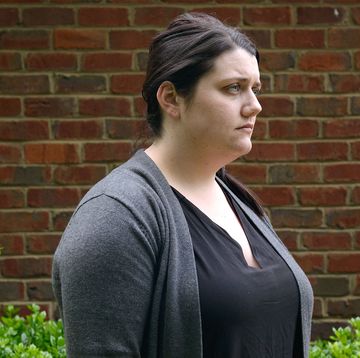Kids make mistakes. For many of us, being a teenager went hand-in-hand with doing dumb stuff: using a fake ID to buy beer, driving too fast, throwing a party when our parents were out of town. Youthful hijinks are practically rites of passage. But when it comes to young white men, far too many adults seem eager to extend the definition of dumb fun to include the sexual violation of women.
The latest example is David Becker, a young man from East Longmeadow, Massachusetts. David went to a party, and when two young women he knew went upstairs to go to sleep, David decided he would jam his fingers into their vaginas. Both of the women woke up while they were being penetrated. That's rape, even if Becker chose to use his fingers instead of his penis.
Becker was charged with two counts of rape, and one count of indecent assault and battery. Becker pleaded to two counts of indecent assault and battery of a person older than 14, and the district attorney asked for two years of jail time. Instead, Palmer District Court Judge Thomas Estes sentenced him to zero days in jail and two years probation, during which he can't use alcohol or drugs, and cannot contact the two women he assaulted (all other women, apparently, are fair game). If he complies with the terms of his probation, he will not go on the sex offender registry and all of the charges will be dismissed; none of this will stay on his record. He will be able to start college in the fall.
"We all made mistakes when we were 17, 18, 19 years old, and we shouldn't be branded for life with a felony offense and branded a sex offender," Becker's lawyer, Thomas Rooke, said. "Putting this kid in jail for two years would have destroyed this kid's life."
When feminists talk about "rape culture," this is what we mean: the framing of sexual violence as something that just happens, that young men just slip into, a kind of "oopsie" or a miscommunication, and not an act of profound violation and violence. It's helpful to put yourself in the shoes of someone like David Becker, or this summer's earlier unpunished rapist, Brock Turner, and think about being in a room with two classmates who were drunk and tired and went to bed. What kind of person sees two people sleeping and their first thought is, I will remove their pants and underwear, expose their genitals, and then digitally penetrate them? Ask yourself: Is that a normal teenage mistake, the kind anyone could have made? Or is it the act of a predator?
It's helpful, too, to put yourself in the position of the victim — especially if you're a man. Men are indeed raped, but most young men don't live, like women do, under a kind of daily threat of sexual violence, with constant reminders to be aware of your surroundings, don't get too drunk, always have cab money on you, don't go jogging with your hair in a ponytail because a rapist might grab it, take cabs together so you're not assaulted, have your keys between your fingers in a parking garage in case you need to stab a rapist in the eye (yes, this is real advice women get). So, men, imagine you get drunk at a party and you pass out, and when you wake up, a classmate of yours has removed your pants and underwear, and stuck his fingers into your anus. Does that seem like your run-of-the-mill youthful shenanigans? A silly error? Would you buy the story Becker told police, that because one of the people "didn't protest," he believed what he was doing was OK?
Women are not walking, talking holes who men are free to penetrate unless we say no. Sexually penetrating someone against their will isn't a harmless blunder or a stupid miscalculation; it is an intentional act of dominance, of total disregard for the other person's sovereignty over their own body. It is an act of violence. It is a sick message to women: Your body is not yours. Not even the inside of it.
It's also reflective of a disgusting and predatory view of sex and women. Women's bodies aren't toys for male indulgence, and consensual sex is, at least in theory, a mutually pleasurable act. Becker clearly doesn't see sex like that — there was not even consciousness on the part of his victims, so there was no consent, let alone pleasure. Sex wasn't something that both parties wanted. There were two women, intoxicated and sleeping, and there was Becker, who decided that the vulnerability of his victims being asleep meant he could do whatever he wanted to them. And what he wanted to do was sexually penetrate them when they couldn't say either yes or no, because he found it fun or arousing, or he just liked knowing that he could. That's a troubling worldview that Becker is walking around with. It's even more disturbing that some adults enable it by suggesting his actions were mistaken, not predatory or criminal.
"He can now look forward to a productive life without being burdened with the stigma of having to register as a sex offender," said Rooke, the attorney, said. "The goal of this sentence was not to impede this individual from graduating high school and to go onto the next step of his life, which is a college experience."
The goal of a criminal sentence should not be to allow a perpetrator to scoot along to "the next step of his life, which is a college experience." Ideally, the goals would be to give a victim some semblance of justice, to protect society from someone dangerous, and to rehabilitate a troubled person so they are no longer a threat. This sentence, which does not mandate any kind of sexual offender counseling or even community service, did exactly none of that.
Becker's lawyer seems particularly pleased that Becker will not have to register as a sex offender. And I don't blame him — there are legitimate problems with the sex offender registry, and in a fairer criminal justice system, no one who has paid their debt to society would be stigmatized for the rest of their life by being put on a list like that one. Becker is lucky to have avoided it, and hopefully, the registry itself will eventually cease to exist. But Becker hasn't paid any debt to society at all. And the framing of his choice to assault two women as a "mistake," and of his punishment as purposed to enable him to move on, suggests he and his advocates do not appreciate the seriousness of what he did.
The "mistake" narrative obscures the reality of sexual violence: It is a choice. And it's not a "bad" choice or a misguided choice or a choice that entailed someone doing a stupid or irresponsible thing but nobody got hurt; it's a violent and violating choice, an act that has real victims. Casting it as a mistake also enables other men to commit the same act, telling them that it's not a big deal, that rape is on par with speeding or sneaking some gin from your parents' liquor cabinet. It tells women that their experiences don't really matter, that their bodies and their sexual organs aren't theirs and aren't sources of pleasure, but rather spaces upon which young men sometimes err.
According to one of the victims, Becker had a reputation for assaulting women, to the point where he was nicknamed "David the Rapist" — an allegation his lawyer denied, because Becker is a three-sport athlete. "Labeling him 'David the Rapist' is truly an unjust character assassination of what this individual has accomplished in the past," Rooke said. As if one cannot be both a rapist and good at sports. As if one cannot have past accomplishments and be a rapist.
As Rooke said, we all made mistakes when we were 16, 17, or 18, and we don't deserve to carry a felony charge or be branded a sex offender for them. The exception to that rule, though, is if we actually committed a felony sex offense. When David Becker decided to rape two women, that is exactly what he did.
David Becker did not make a mistake. David Becker committed rape. David Becker is a rapist. David Becker raped two women.
Follow Jill on Twitter.

Jill Filipovic is a contributing writer for cosmopolitan.com. She is the author of OK Boomer, Let's Talk: How My Generation Got Left Behind and The H-Spot: The Feminist Pursuit of Happiness. A weekly CNN columnist and a contributing writer for the New York Times, she is also a lawyer.












